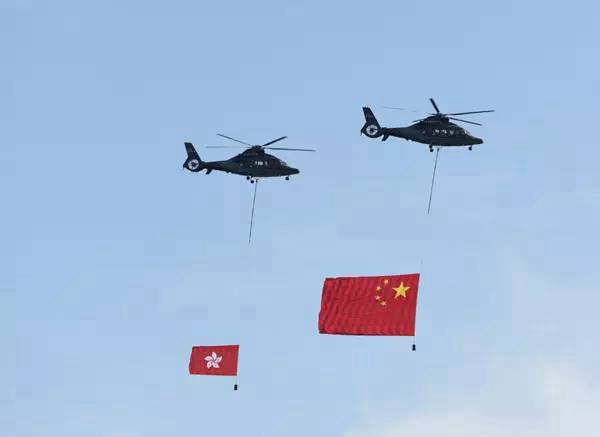HKSAR: Stolen jewel back in China's crown!
- By Earl Bousquet
 0 Comment(s)
0 Comment(s) Print
Print E-mail China.org.cn, July 13, 2017
E-mail China.org.cn, July 13, 2017
|
|
|
The 20th anniversary of the reunification of Hong Kong with the mainland. [Xinhua] |
The 20th anniversary of the reunification of Hong Kong with the mainland has come and gone. It was as much the grand affair it was planned to be. However, as July 1 approached, the Western press went into overdrive to make it appear as an event not worthy of memory or celebration.
Some big networks outdid each other, looking and sounding as if they were competing for best portrayal of the July 1, 1997 British "handover" as an entirely regrettable event.
However, despite the massive unfriendly buildup, the celebration saw none of the much-heralded incidents. Hong Kong's new Chief Executive Carrie Lam was sworn-in; China's President Xi Jinping gave assurances that "Hong Kong is always in my heart," and reiterated that the “One Country, Two Systems” approach would remain official policy towards the Special Administrative Region.
However, nothing President Xi said resonated positively with the Western media, which simply refuse to accept that Hong Kong already reflects a successful two-tier political system that recognizes socialist governance without threatening the capitalist financial and economic underpinnings of this prized Asian financial hub.
Within five years of reunification, Hong Kong had gained notoriety (in the West) as “the demonstration capital of the world,” seen as reflecting the fact that the government in Beijing was observing the rudimentary aspects of the territory's “two systems” policy, but not the substance.
Western media detractors relentlessly continue to try to manipulate the youthful enthusiasm of Hong Kong's Internet generation, to negatively create a generational gap between them and those old enough to better understand today's different reality.
Hong Kong youth today simply cannot imagine that, just a few decades ago, their city was best known the world over as a manufacturer of clocks and cameras. Unable to remember what they didn't live through, their dreams of a world envisioned through an online prism blind them to appreciation of what has been achieved in 20 years.
Today, under the unique two-tiered political and economic policy, the booming city of 7.3 million people is a shining star in Asia. Its GDP rose 50 percent between 1997 and 2015; it is home to offices of 70 percent of the world's top 100 banks; its main port is a veritable thermometer for world trade; and its politics and economics offer bright reminders that change does not always have to be driven by force.
Now, following the 20th anniversary celebration, Hong Kong has been designated by Beijing as the new global gateway to China's massive bond market, currently the world's third largest.
The 50-year official transition from the colonial entity China inherited in 1997 is approaching the halfway mark. Beijing has demonstrated, time and again, that it will not stifle peaceful dissent in the Hong Kong Special Administrative Region (HKSAR).
In his 20th anniversary speech, President Xi Jinping appealed for "consensus" to be the main factor driving discussions on the future of the HKSAR. He also admitted the “One Country, Two Systems” approach faces "new challenges."
To meet and overcome them in the three decades leading up to 2047, Beijing (and successive HKSAR administrations) will have to find ways to convince each young Hong Kong generation that it is they who will benefit most from where and what their city will be when the 50-year transitional period ends.
That may be no easy task. However, it was not that easy for China to show the world that life can indeed change forever in one short lifetime.
Hong Kong today is well-placed to achieve that, and an appropriate road map is already on the drawing board.
China's Belt and Road initiative is a new global economic reality traversing at least three continents and likely to encompass a minimum of 60 states. Likewise, Hong Kong-Zhuhai-Macao bridge, intended to be the world's longest across any stretch of water, will also open a “way to go” to bridge the gap for so long separating the mainland and its two prized cities.
The Western press continues to mistakenly predict China and Hong Kong's future by gazing through crystal balls of blind hypotheses. However, the People's Republic's increasing prominence as a critical political and economic factor on the world stage continues to be manifested in so many new ways and areas that the naysayers simply cannot keep pace.
Earl Bousquet is a contributor to china.org.cn, editor-at-large of The Diplomatic Courier and author of an online regional newspaper column entitled Chronicles of a Chronic Caribbean Chronicler.
Opinion articles reflect the views of their authors, not necessarily those of China.org.cn.






